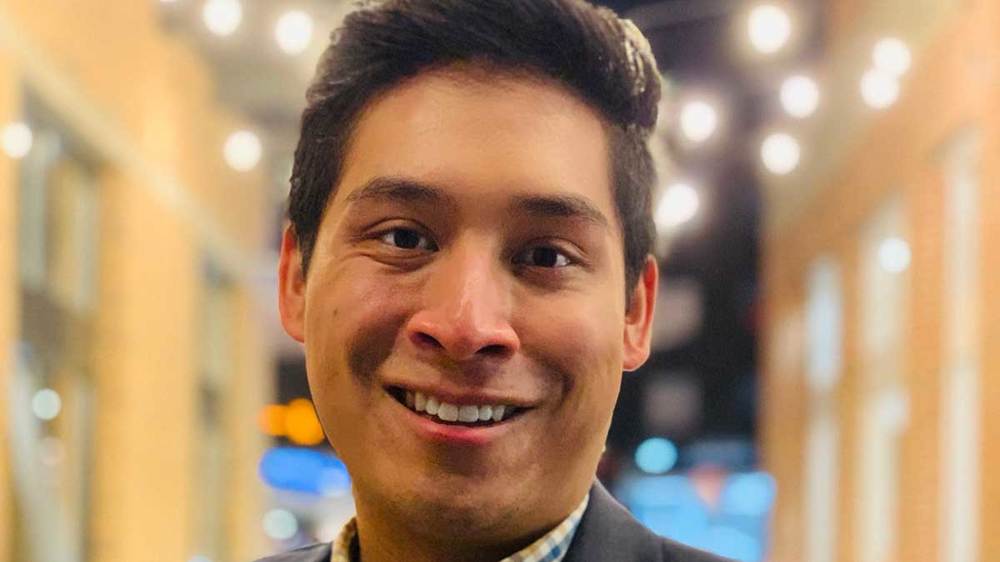
Gregory Serapio-García talks about his research on how the digital world can improve mental health.
I want to use the data I have gathered for the social good.
Gregory Serapio-García
Gregory Serapio-García didn’t just do a little bit of research during his undergraduate studies. He independently gathered data from around 9,000 participants in 105 countries in nine different languages to get a comprehensive picture of subjective well-being across cultures.
His interest in mental health and how the digital world can improve it will form the basis of his PhD in Psychology which he begins this autumn.
Gregory [2019] believes the future of improved mental healthcare begins with culturally-inclusive, person-specific assessments informed by ethically-collected data in the digital age.
That commitment is clear from his undergraduate work with Dr David Watson and Dr Lee Anna Clark, two academic experts in clinical and cross-cultural personality psychology at the University of Notre Dame in the US. He used crowdsourcing platforms such as Amazon Mechanical Turk to get access to large numbers of English-speaking participants and ran several assessments on them, including Watson and Clark’s widely-cited Positive and Negative Affect Schedule (PANAS) scales, which measure positive and negative emotions, the HEXACO Personality Inventory – Revised (HEXACO-PI-R) and the Satisfaction with Life Scale. He also tracked down validated translations of these assessments in Spanish, Chinese, Turkish, Korean and Japanese, among others. “I was interested in how we can generalise basic traits like happiness across cultures so we can get an accurate picture of depression,” he says.
Gregory’s research throws up issues for those looking at well-being – for example, the fact that the expression of emotions is less strong in East Asia than in more individualistic western cultures. “Happiness in collectivist cultures is more associated with inner peace, belonging and community, he says. “According to cross-cultural personality research, people from East Asia tend to be less emotionally expressive,” he states. This is important for understanding levels of depression and treating them since, for instance, different expressions of neuroticism in the East Asia may not be as associated with unhappiness as they are in the West.
To collect the data, Gregory used a range of skills gained during his undergraduate studies. For instance, after being selected for a competitive internship with the US National Science Foundation’s Computational Social Science REU, he learned how to apply high-performance and distributed computing techniques to big data on the Internet. Gregory then developed and funded a study that used social media big data to computationally predict mental illness traits – a project which evolved into his undergraduate honours thesis.
He is currently helping to develop the official personality disorder measure for the World Health Organisation’s upcoming International Classification of Diseases, 11th Edition, which seeks to assess mental illness traits in a cross-culturally relevant way.
Computer science and psychology
Gregory’s research interests bring together an early passion for both computer science and psychology. Born in Stanford, California, he grew up in the San Francisco Bay Area, a region with a lot of tech start-up companies. An only child, his mother and father separated when he was young. Gregory’s mother was diagnosed with a brain tumour which meant Gregory had to look after her. The tumour meant even minor illnesses were capable of causing her major health problems because her immune system was so compromised.
Gregory opted to homeschool himself in his last two years of high school so that he could be around for his mother. “I was already an independent learner,” he says, “and homeschooling myself really helped we with independent study when I went to college.”
In middle school, he developed a particular interest in technology. He had to do a project on innovators and chose Steve Jobs. He then began collecting vintage Apple computers so he could learn how to programme them. His interest in psychology was jump started by watching Big Brother and reading about Philip Zimbardo’s controversial work in social psychology.
When he arrived at college he became interested in how personality traits could predict disease, mental health and life outcomes and the spectrum between traits such as conscientiousness and its pathological counterpart OCD. This interest was also influenced by the fact that Gregory had grown up with ADHD, an “invisible” learning disability which meant he could be easily distracted. He says the condition is also associated with creativity as those with it are able to think differently and connect disparate ideas. For him he says it has also meant that when he has found something that really interests in, he has been able to be hyper focused on it.
Looking back, Gregory feels he reframed the negatives of his condition to serve as academic strengths and he hopes his example can inspire others to counter the stigma of invisible disability. “It has meant that I approach my research in a different way, which is useful given the area I am now interested in is very new,” he says.
Undergraduate studies
Nevertheless, when he started at Notre Dame Gregory was not sure what the focus of his studies should be. He chose the university for several reasons. At the time he chose he was very involved in the youth ministry of his local Catholic church, volunteering in the community on social justice issues. Notre Dame also had good resources to support research funding and Gregory was selected as a Glynn Scholar in his first year. This meant he was in the top 100 students admitted academically and through the scholarship he won research funding and access to small seminar groups with leading professors.
By the second semester of his first year Gregory had decided to specialise in the psychology of personality and by the summer he was researching subjective well-being across cultures. His decision was partly the result of being placed on a mentorship programme for underrepresented students of colour where he was matched with Dr Daniel Lapsley, chair of the Psychology Department. He combined his studies in Psychology with a minor in Computing and Digital Technologies.
At Cambridge, where he will do a PhD in Psychology, Gregory will work with Dr Jason Rentfrow, an Alan Turing Fellow and personality psychologist who specialises in online behavioural research. Gregory is also looking forward to working with Dr David Stillwell, who, as Deputy Director of Cambridge’s Psychometrics Centre, shares Gregory’s interests in computational social science.
He chose Cambridge because it is the only university that has a centre that is dedicated to psychometric study of the internet and because of his commitment to using the internet to improve mental health assessments, particularly to improve the care for people in developing countries. “I want to use the data I have gathered for the social good,” he says.

Gregory Serapio-García
- Scholar
- United States
- 2019 PhD Psychology
- St John's College
A San Francisco Bay Area native, I grew up immersed in and fascinated by technology. Carrying this fascination with me to study Psychology and Computing and Digital Technologies at the University of Notre Dame, I used my first research grants to conduct a crowdsourced Internet study of personality and subjective well-being in 105 nations and nine languages. At Notre Dame’s Center for Advanced Measurement of Personality and Psychopathology, I developed an interest in the overlap of clinical disorders with everyday personality traits. In 2017, I was selected for a National Science Foundation (NSF) Computational Social Science REU at Notre Dame’s Center for Research Computing where I used machine learning to predict mental health dimensions from social media big data. By pursuing a PhD in Psychology at Cambridge under the mentorship of Dr Jason Rentfrow, I will synthesize mobile-sensing and personality data to predict mental health outcomes and subjective well-being. I hope to help automate lengthy clinical assessments through computational analyses of social media big data with Dr David Stillwell and colleagues at The Psychometrics Centre. As a Gates Cambridge Scholar and social data scientist, I hope to inform the next generation of the world’s best physicians, lawyers, philosophers, and educators of both the promise of online social data in transforming mental healthcare and the moral imperative to combat the exploitative use of big data in this proliferating field.
Previous Education
University of Notre Dame Bachelor of Arts in Psychology 2019












